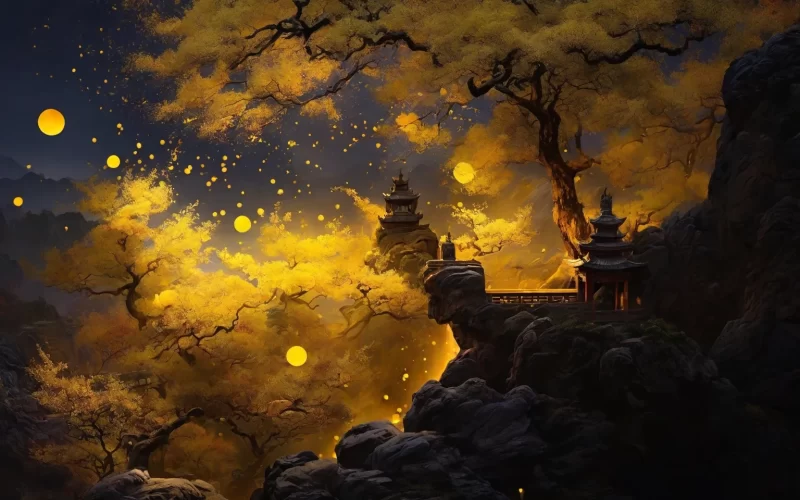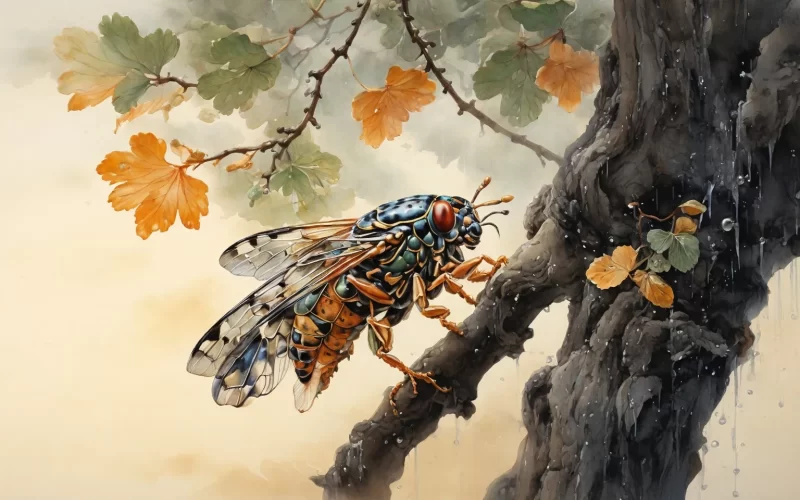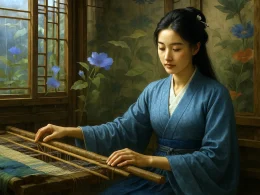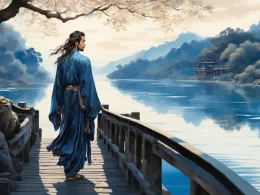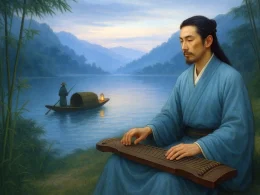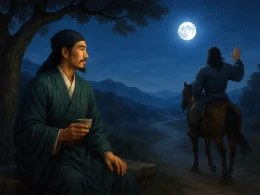Flickering, you shed a green light;
Wafting weak wings, you flit in flight.
Being afraid to be unknown,
In the darkness you gleam alone.
Original Poem
「咏萤」
虞世南
的历流光小,飘飖弱翅轻。
恐畏无人识,独自暗中明。
Interpretation
This poem stands as one of the most philosophically profound among Yu Shinan's numerous object-poems. Having served in both the Sui and Tang courts, Yu was known for his humility and virtue—a diligent scholar in youth, an accomplished official in midlife, and a contemplative recluse in his later years. Through the metaphor of the faintly-glowing firefly, the poem expresses the poet's unyielding commitment to shine despite marginal positions and obscurity, reflecting both the solitary nobility of maintaining self-worth and the introspective tenacity characteristic of scholarly spirit.
First Couplet: "的历流光小,飘飖弱翅轻。"
Dílì liúguāng xiǎo, piāoyáo ruò chì qīng.
Flickering, its gleam is faint and slight,
Fluttering, its fragile wings take flight.
This couplet meticulously captures the firefly's delicate beauty, with "faint and slight" radiance and "fragile wings" emphasizing its diminutive frailty—a wisp of life dancing in darkness. The poet crafts an image where fragility coexists with luminance, subtly introducing the metaphor that "even the smallest may bear light." The description serves as the foundation for the philosophical meditation to follow.
Second Couplet: "恐畏无人识,独自暗中明。"
Kǒng wèi wú rén shí, dúzì ànzhōng míng.
Fearful of passing unseen,
It shines alone in the night's obscurity.
Here, the poem shifts from physical depiction to psychological depth. By endowing the firefly with human apprehension, the poet shapes it into a figure of quiet determination. "Fearful of passing unseen" reveals an anxiety over being overlooked, while "shines alone in the night's obscurity" transforms that fear into resolute self-affirmation. This is no longer merely insect behavior but a mirror of the poet's own ideals—an insistence on radiating one's light, even when unwitnessed, embodying the introspective perseverance of the scholarly spirit.
Holistic Appreciation
Though merely four lines, this poem carries profound depth. The poet first depicts the firefly's luminous flight, then imbues this tiny creature—often overlooked—with an indomitable spirit. Through empathetic personification, an ephemeral insect transforms into a vessel of human dignity. No longer just a natural phenomenon, the firefly becomes a metaphor for "radiating light despite insignificance"—persistently glowing in darkness like an upright scholar maintaining integrity amid obscurity. This emotional projection infuses the seemingly delicate verses with quietly stirring power.
Artistic Merits
- Epiphany in Miniature: By focusing on the humble firefly, the poem reveals cosmic truths, proving how trivial subjects can bear weighty philosophy.
- Anthropomorphic Alchemy: "Fear of going unnoticed" humanizes the insect, creating resonant emotional transference between observer and observed.
- Subtle Language, Lasting Echoes: Deceptively simple diction—particularly the line "alone, bright in darkness"—conveys proud self-assurance through understatement.
- Harmony of Reason and Sensibility: Combines keen natural observation with existential meditation on reputation and purpose, elevating the work beyond mere description.
Insights
This luminous micro-epic proposes that even the frailest beings matter when they honor their inner light. The poet's identification with the firefly models a life stance: solitary yet connected, vulnerable yet unyielding. Modern readers might heed its message—amid societal clamor and功利 temptations, we must safeguard our authentic glow. True worth lies not in others' recognition, but in steadfast self-illumination.
Poem translator
Xu Yuanchong (许渊冲)
About the poet
Yu Shinan (虞世南, 558 - 638), a native of Yuyao in Zhejiang province, was a distinguished early Tang statesman, calligrapher, and literary figure. His poetry retained the lingering elegance of Southern Dynasties courtly verse while evolving toward a clearer, more refined style. In calligraphy, he is ranked among the "Four Masters of Early Tang" alongside Ouyang Xun and Chu Suiliang, celebrated for his disciplined yet graceful brushwork that synthesized classical traditions.






